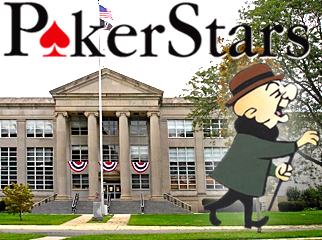 Online poker outfit PokerStars has filed another brief ahead of its head-to-head battle with Atlantic City casino The Atlantic Club in New Jersey Superior Court on Friday. Wednesday’s brief in support of a preliminary injunction to prevent the Atlantic Club from selling itself to a buyer other than Stars directly addresses claims made in Monday’s filing by the Atlantic Club, which sought to lift the temporary restraining order (TRO) Stars obtained the previous week.
Online poker outfit PokerStars has filed another brief ahead of its head-to-head battle with Atlantic City casino The Atlantic Club in New Jersey Superior Court on Friday. Wednesday’s brief in support of a preliminary injunction to prevent the Atlantic Club from selling itself to a buyer other than Stars directly addresses claims made in Monday’s filing by the Atlantic Club, which sought to lift the temporary restraining order (TRO) Stars obtained the previous week.
If you’re just joining us, Stars struck a deal to buy the financially struggling casino in November, with the intention of using its gaming license as an entry into New Jersey’s online gambling market. But delays in processing Stars’ interim gaming license application meant the deal couldn’t be officially consummated by the date cited in the original deal, at which point the Atlantic Club announced the deal was dead and said it was open to bigger and better bids from other suitors. Disputing the casino’s interpretation of what constituted a ‘closing date’, Stars requested and obtained the (TRO), and here we are.
BRAZEN HUSSIES
In Wednesday’s brief, Stars rails against the Atlantic Club “brazenly” admitting its intention to flog itself on the open market, which Stars says has “broadcast [the Atlantic Club’s] misconduct to the world.” Stars considers this admission to be sufficient reason to keep the TRO in place. Stars reasserts that the originally envisioned timeline for closing the deal fully contemplated the possibility of a licensing delay and thus attempts to kill the deal would violate covenants of good faith and fair dealing.
Stars argues that the Atlantic Club has failed to demonstrate that allowing the deal to play itself out to its August conclusion would cause the casino “immediate and irreparable harm.” New Jersey’s online gambling market isn’t set to commence until November, so even if regulators reject Stars’ license bid, there would still be “sufficient time” for the Atlantic Club to do an alternate deal. Assertions by the Atlantic Club that they need to be able to shop themselves to other buyers because Stars is unlikely to win license approval are irrelevant, as the Atlantic Club has no say in the licensing process.
As for the Atlantic Club’s assertion that the possibility of Stars losing the $11m it has fronted the casino since doing the deal was “the risk [Stars] took for the opportunity of being at the forefront of online gaming,” Stars admits it took a risk, but the risk was doing the deal months before Gov. Chris Christie signed the state’s online gambling bill into law. Stars knew there was every possibility that Christie would veto the bill, as he’d done two years prior, which would have left Stars with nothing more to show from the deal than a near bankrupt gaming hall in a dying casino market. However, Stars maintains that it didn’t take that risk with the understanding that the Atlantic Club would seek to weasel out of the agreement “without basis, solely to find a ‘better deal’…”
PULL THE OTHER ONE
Stars also pokes holes in the rather preposterous claims made by the Atlantic Club in its Monday filing that it wasn’t aware of the full extent of the legal cloud lingering over Stars via the Black Friday indictments. Stars offers up a December email it received from Atlantic Club CEO Michael Frawley that included a media report detailing the full scope of Stars’ legal woes. As for the suggestion that the American Gaming Association’s March 4 petition protesting Stars’ license bid had opened the Atlantic Club’s eyes to the full extent of Stars’ chicanery, Stars points out that two weeks later, Frawley gave an interview to PokerNews.com suggesting the AGA had an “ulterior motive” behind filing its petition against “a great company” like Stars.
As for Atlantic Club CFO Eric Matejevich’s claim that a phone call he received from Stars’ founder Isai Scheinberg on April 26 – the day the casino announced the deal was dead – indicated that Scheinberg was “fully involved” in the deal-making process, Stars asserts that the call was “entirely within the framed scope of Mr. Scheinberg’s role with respect to PokerStars” as dictated under the terms of the $731m settlement Stars reached with the US Department of Justice on the Black Friday civil charges.
The outcome of Friday’s hearing will largely hinge on the specific wording of the original deal, which neither party has seen fit to publicly disclose. Whose interpretation of what constitutes a ‘closing date’ will prevail? Watch this space…






